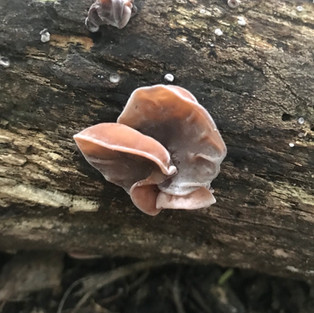Jelly Ears (Auricularia auricula- judae), Mycobee Library No.22
- Feb 12, 2020
- 3 min read
Updated: Feb 26, 2023
Scientific name: Auricularia auricula- judae
English name: Jelly Ears
Polish name: Uszak bzowy
At this time of the year is worth to look for Jelly Ears. In fact grows all year around. It has lots of health benefits, easy to dehydrate and can be stored for a long time. Great addition to any meal, it can be rehydrated again and keeps the same form as fresh.
I really love this mushroom 🍄
Here are the health benefits:
The Auricularia is a vital mushroom with a long tradition and a remarkable organic vital substance content. It promotes the free flow of vital energy.
This mushroom is also known as Jew’s ear, owing to its growth in the shape of an auricle. Enthusiasts are more familiar with it in Asian cuisine as “Mu-Err”, or “Chinese morel”, as a fine edible mushroom.
Auricularia grows on deciduous trees and can be found all around the world.
The Auricularia is also said to be the first type of mushroom to be cultivated by people. This is indicated in Chinese manuscripts from the 6th century. The mushroom has a relatively neutral taste. Its special feature in Asian cuisine is that after being dried, it can swell back almost to its original form by adding liquid. This mushroom has a particular texture in the mouth in Asian soups and stews.
Its medicinal properties have long been known both in Asia and in Europe. In Europe it has been implemented since the Middle Ages to treat disorders and conditions such as cardiac and abdominal pain or toothache, haemorrhoids, inflammations of the eye, to support wound healing or to strengthen weakened immune systems.
Today, Auricularia is highly valued for its capability of improving blood fluidity. It is the so-called blood thinner among the medicinal mushrooms.
However, due to its adaptogenic properties, Auricularia is also traditionally administered to treat blood in the urine, haemorrhoid bleeding and uterine haemorrhage.
Auricularia confirms: medicinal mushrooms are never effective unilaterally or for only one specific purpose!
Studies verify that Auricularia can prevent the aggregation of thrombocytes and thus reduce the risk of a thrombosis and promote the blood circulation. Possible cardiac infarctions or strokes can thus be prevented. It also lowers cholesterol and triglyceride levels. These properties are of particular importance for an existing arteriosclerosis or hypertension/high blood pressure.
Auricularia contains adenosine, which has known vasodilatory properties and stimulates blood circulation. Dilatation can alleviate cardiac pain and lower the blood pressure. Practically, this jelly-like mushroom can also be implemented to prevent cerebral ischemia. Through its active ingredients, Auricularia enhances cellular oxygen absorption and thus protects cranial nerves from damage caused by oxygen or blood deficiencies. Thanks to its cholesterol lowering and blood fluidity improving properties it counteracts vascular dementia, because dementia frequently follows cerebral insults. The risk of these can be reduced through the administration of this medicinal mushroom.
Auricularia is also hepful by intermittent claudication. This condition, triggered by a peripheral vascular disease, involves extreme leg pain under stress, especially when walking due to insufficient circulation. Here Auricularia strengthens the vessels and facilitates their circulation. Because of these properties, it is also recommended for long-distance flights, in the treatment of varicosis, by insufficient physical activity or confinement in bed, migraine and tinnitus.
According to Traditional Chinese medicine (TCM), it can moisturise mucous membrane and thus soothes mucosal inflammations. It is supportive in the treatment of constipation caused by dehydration, tracheal cough, cystitis and otolaryngological (ear, nose and throat) diseases. Auricularia also strengthens mucosal membranes damaged by chemo or radiation therapies
Application fields in Traditional Chinese Medicine
Properties: sweet, neutral, mild
acts on stomach, spleen, colon, lung & liver
relaxes, distributes and regulates the Qi
antihaemorrhagic (esp. by haemorrhoids, uterus), nourishes blood
laxative
moisturizes the lung
reinforces the stomach’s Yin
counteracts Yin weakness = dry lung, stomach and intestines
counteracts dry cough, throat and mouth
counteracts lumbar and leg pain
for excessive leucorrhoea
counteracts cramps, numbness and pain after accidents or injuries
counteracts vascular blockage
CONTRAINDICATIONS:
Pregnancy, breast feeding, desire to have children, proneness for diarrhea
Info source: Mykotroph.de


















































































Comments